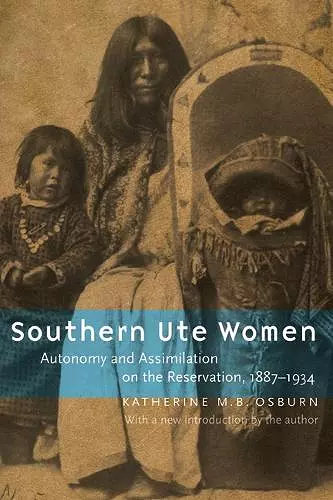Southern Ute Women
Autonomy and Assimilation on the Reservation, 1887-1934
Katherine M B Osburn author Katherine M B Osburn editor
Format:Paperback
Publisher:University of Nebraska Press
Published:1st Jan '09
Currently unavailable, and unfortunately no date known when it will be back

Shows how Ute women accommodated Anglo ways that benefited them but refused to give up their indigenous culture
Shows how Ute women accommodated Anglo ways that benefited them but refused to give up indigenous culture and ways that gave their lives meaning and bolstered personal autonomy.After the passage of the Dawes Severalty Act in 1887, the Southern Ute Agency was the scene of an intense federal effort to assimilate the Ute Indians. The Southern Utes were to break up their common land holdings and transform themselves into middle-class patriarchal farm and pastoral families. In this assimilationist scheme, women were to surrender the considerable autonomy they enjoyed in traditional Ute society and become housebound homemakers, the “civilizers” of their fathers, husbands, brothers, and sons. Southern Ute Women shows that these women accommodated Anglo ways that benefited them but refused to give up indigenous culture and ways that gave their lives meaning and bolstered personal autonomy. In spite of federal policies that stripped women of many legal rights, Southern Ute women demanded participation in political, economic, and legal decisions that affected their lives and insisted on retaining control over their marital and sexual behavior.
“[Southern Ute Women] makes a useful contribution to the growing body of scholarship on Native American women.”—Sara H. Hill, American Historical Review
“Historians of American Indians have devoted insufficient attention to the distinctive experiences of Native American women, although in recent years a number of scholars have made strides in reversing that trend. With Southern Ute Women, Katherine Osburn helps redress this gap in the historiography. . . . A thoughtful, incisive, and well-written monograph that does much to further our understanding of the dynamic lives of Native American women in the allotment era.”— Steve Amerman, Western Historical Quarterly
“A well-researched, clearly written account that adds to our understanding of the power dynamic between a dominating federal government and a subordinate, but not completely coerced, reservation population.”— Sherry L. Smith, Agricultural History
ISBN: 9780803220386
Dimensions: unknown
Weight: 295g
208 pages